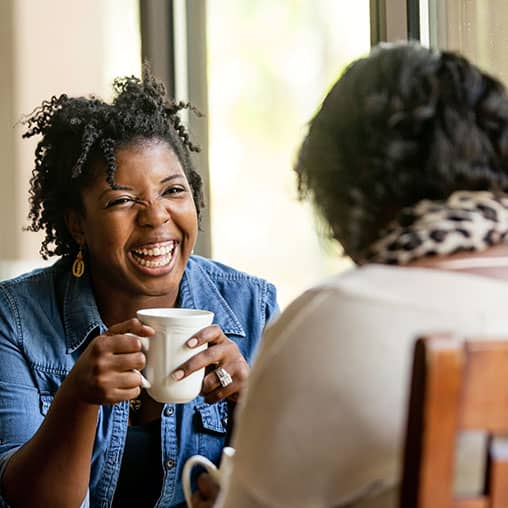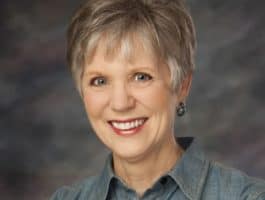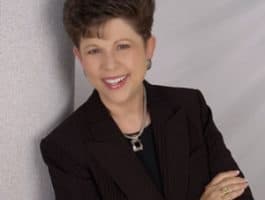
Mentoring Over Coffee
Think you'd like to be a mentor? Then why don't you start with coffee. Seminary professors Barbara Neumann and Dr. Sue Edwards encourage women to be attentive to the mentoring opportunities around them, and to forget the idea that mentoring has to be structured. They remind women that reaching a younger generation means they'll need to enter the world of millennials.
Show Notes
About the Host
About the Guest
-
Think you'd like to be a mentor? Then why don't you start with coffee. Seminary professors Barbara Neumann and Dr. Sue Edwards encourage women to be attentive to the mentoring opportunities around them, and to forget the idea that mentoring has to be structured. They remind women that reaching a younger generation means they'll need to enter the world of millennials.
-
Dave and Ann Wilson
Dave and Ann Wilson are hosts of FamilyLife Today®, FamilyLife’s nationally-syndicated radio program. Dave and Ann have been married for more than 38 years and have spent the last 33 teaching and mentoring couples and parents across the country. They have been featured speakers at FamilyLife’s Weekend to Remember® marriage getaway since 1993 and have also hosted their own marriage conferences across the country. Cofounders of Kensington Church—a national, multicampus church that hosts more than 14,000 visitors every weekend—the Wilsons are the creative force behind DVD teaching series Rock Your Marriage and The Survival Guide To Parenting, as well as authors of the recently released book Vertical Marriage (Zondervan, 2019). Dave is a graduate of the International School of Theology, where he received a Master of Divinity degree. A Ball State University Hall of Fame quarterback, Dave served the Detroit Lions as chaplain for 33 years. Ann attended the University of Kentucky. She has been active alongside Dave in ministry as a speaker, writer, small-group leader, and mentor to countless wives of professional athletes. The Wilsons live in the Detroit area. They have three grown sons, CJ, Austin, and Cody, three daughters-in-law, and a growing number of grandchildren.
-

Barbara Neumann
Barbara Neumann (DMin, Dallas Theological Seminary) is an adjunct professor in the Educational Ministries and Leadership department at Dallas Theological Seminary.
Sue Edwards
Dr. Edward’s heartbeat is to reinforce ministry partnerships between men and women, which strengthen church and parachurch organizations locally and worldwide. She has thirty-five years of experience in Christian education and Bible teaching, directing women’s ministry, retreat and conference speaking, training teams and teachers, overseeing staff, and writing curriculum. As former pastor to women at her local church she experienced healthy men and women partnerships on staff, and her passio...more
Barbara Neumann and Dr. Sue Edwards encourage women to be attentive to the mentoring opportunities around them, and to forget the idea that mentoring has to be structured.
Bob: A lot of younger women today say they would love to have older women, who are giving them counsel / who are pouring into their lives; but Barbara Neumann says, “They’re not looking for someone to be the Bible-answer woman.”
Barbara: What they tell me is that: “What I want is someone who will listen to my life / listen to what I’m saying. Help me process it and make biblical decisions,” because many of them don’t know the Bible—they don’t know how to think biblically. Just that opportunity to process life with a more-experienced person, many times, transforms the way they think.
Bob: This is FamilyLife Today for Thursday, November 19th. Our host is the President of FamilyLife®, Dennis Rainey, and I’m Bob Lepine. What does it look like to effectively mentor a younger man or a younger woman? We’re going to spend time exploring that subject today. Stay tuned.
1:00
And welcome to FamilyLife Today. Thanks for joining us.
Dennis: Bob, I’m still trying to get over a pronouncement that was made by one of our guests on the broadcasts earlier.
Bob: What pronouncement?
Dennis: Well, the guest, who is a professor at Dallas Theological Seminary, said she wanted to deep-six the word, mentor.
Bob: Yes.
Dennis: So, I went and did a little research.
Bob: Okay.
Dennis: I feel a little bit better about deep-sixing the word, mentor. The reason is—I used my Logos word study—
Bob: Yes.
Dennis: —which is powerful.
Bob: The Bible study software; yes.
Dennis: It’s powerful. And the word, mentor, does not appear in the Bible.
Bob: So, you’re okay getting rid of it?
Dennis: I feel a little better that a Dallas Seminary Prof wanted to deep-six the word, mentor. [Laughter]
2:00
Bob: How about mentee? We—
Dennis: I didn’t look that one up.
Bob: Okay; well, I’ve got the work down on this. Keith, the engineer, went to work, as you said / as you directed him to do earlier. He has the pronouncement. So, Keith, the engineer—“Is mentee—is it an official word? Can we use that word?”
Keith: It’s an official slang word.
Barbara: Okay.
Bob: Official slang—it’s in Urban Dictionary.
Keith: But not in any gold-standard etymology.
Bob: Okay; alright.
Dennis: Dr. Barbara Neumann and Dr. Sue Edwards join us again on the broadcast. Ladies, welcome back.
Barbara: Thank you.
Sue: Thank you.
Dennis: They both teach at Dallas Theological Seminary, and they have coauthored a book called Organic Mentoring. I really am tempted to tell the story about organic, but I’m not going to do it.
Bob: I’m glad. I’m just thinking, “If she’s going to deep-six the word, mentor, she’s got a problem with her book; doesn’t she?”
Dennis: She does.
Sue: Well—
Dennis: She’s planting it!
Sue: Yes. There you go!
Dennis: Yes, that’s what she’s doing.
Sue: Yes.
3:00
Dennis: So, okay; Sue, what word are you going to use if you’re going to eliminate this from our vocabulary and you can’t use it in this broadcast?
Sue: Well, I’m using it in the broadcast, and I’m using it in training, and we’re using it in the book. We’re just not using it when we attempt to invite someone to be your mentor. Actually, though, it’s funny—we just ask them to coffee. We just ask them to come and spend time with—the younger woman does that for the older woman.
Bob: It’s an invitation to relationship; isn’t it?
Sue: Exactly.
Barbara: It is.
Sue: But it’s not just a friendship. It’s someone, who is more experienced, moving, helping, guiding, asking the right questions, praying with, listening to, and then, giving biblical perspective as it’s needed to move them closer to Christ / to grow them up in the faith.
Dennis: And here’s what I want to really underline here—
4:00
—the concept of mentoring is taught from Genesis to Revelation.
Sue: Yes.
Dennis: It is the DNA of the Book.
Sue: It is.
Bob: I think of two particular passages that always come to mind for me—I think the classic is Titus, Chapter 2—there, older men are instructed to teach younger men certain things / older women to teach younger women certain things. Then, I also think of—isn’t it 2 Timothy 2:2 that says, “That which you have heard from me you are now to pass on to other men who will pass it on to others.” It’s this cycle of: You learn / you pass on.
Sue: Right.
Bob: I tell—
Dennis: Well, I’ve got two more.
Bob: Okay.
Dennis: Okay, Deuteronomy 6—
Sue: That’s our flagship verse.
Bob: —parents and children.
Dennis: Yes, you’ve got to pass on your experience of God and your knowledge of God to the next generation. The other is the Great Commission.
Barbara: Absolutely.
Dennis: Jesus called us to make disciples. I think, at the heart of discipleship is that dreaded word, mentor.
Sue: Yes.
5:00
Dennis: I mean, it is one person passing onto another, sharpening their life to become like Jesus Christ.
Bob: But Barbara, here’s how I’ve said it to folks at our church—I’ve said: “Everybody in our church should be able to answer the question: ‘Who is pouring into you?’ Then, you should be able to answer the question: ‘Who are you pouring into?’” And I said, “If somebody is not pouring into you, and you’re not pouring into somebody, there’s a swamp occurring somewhere; and that will just stink up the place.”
Barbara: That’s a great picture.
Bob: So, you need somebody pouring into you—
Barbara: Yes.
Bob: —and you need to be pouring into somebody. That’s what this is all about; isn’t it?
Barbara: It is. And going back to the Deuteronomy 6 passage—Moses was speaking to the entire nation of Israel. We normally see that in the context of parents teaching their children; but if you look at it carefully, he was speaking to the entire community—believing community / the people of God.
Sue: “Hear, O Israel.”
Barbara: Yes. So, this charge, I believe, was given to all people of God to be a part of this movement to grow the next generation of people.
6:00
Dennis: I think it’s important for us to read this and—
Barbara: Okay.
Dennis: —just let you ladies comment on it.
Deuteronomy 6:4:“’Hear, O Israel! The LORD is our God, the Lord is one! You shall love the LORD your God with all your heart and with all your soul and with all your might. And these words, that I command you today, shall be on your heart; you shall teach them diligently to your children and talk of them when you sit in your house and when you walk by the way and when you lie down and when you rise up. You shall bind them as a sign on your hand and they shall be as frontlets between your eyes. You shall write them on the doorpost of your house and on your gates.’”
Barbara: Yes.
Dennis: It’s a way of life.
Barbara: Yes, it’s a way—
Sue: Yes.
Barbara: —it’s natural / it’s organic. It’s something that happens in the teachable moments when you are doing life together.
Sue: Right, we have called this organic mentoring because it’s essentially attentiveness to opportunities that arise in normal everyday life.
7:00
If you are attentive to that—if you’re attentive to opportunities—they pop up everywhere. So, we retrain—bringing women out of the idea that: “This is a structured program, where you have to be qualified,” or “…something you must sign up for and make a commitment to.” We want to set—
Barbara: Yes.
Sue: —all of that aside and say, “Just be attentive to the natural opportunities that are going to pop up every day of your life, as a believer.”
Bob: So, we’re talking today to Sue Edwards and Barbara Neumann, authors of the book, Organic Mentoring.
We had three older women at our church come to the leadership recently. They said, “We would like to get something started with mentoring younger women in our church.”
Sue: Okay.
Bob: Okay, they have the desire. They—I think it’s a Holy Spirit-given unction in their lives.
Sue: It is.
Bob: They are in a stage in life where they want to be pouring in.
8:00
They said: “We’d like to do this. We’d like to set up a meeting, invite the younger women to come and talk about how we could initiate mentoring relationships.”
Dennis: Now, at first, they’ve got to call Sue and see if they can get permission to use the word, mentor.
Sue: No! [Laughter]
Bob: Well, I would like to—and I’m just going to pass on to them whatever you tell me. So, if you are sitting down with these three ladies—and they’re saying: “We have this desire,”—how would you direct us to get started and to start doing something?
Sue: Well, it’s wonderful that they have the desire.
You know, I worked in churches, as a women’s leader for a number of years, where we set up a program. That, for older women, is the first thing they think of: “I’ve got to set up a program. How will we do this?” Kind of, in our modern way of thinking: “Well, we’ll match them up artificially. We’ll tell them how long to meet. We’ll give them curriculum.” The intent is good; but it is exactly what I saw not working, even 15 years ago.
9:00
Occasionally, it works. There are probably listeners out there: “Well, wait a minute! This worked for me.”
It can work / sometimes, it works; but take your energy that you were using in this program and, instead, create a mentoring culture in your faith community. That is needed because in—especially in a lot of our communities today / a lot of our churches—we never come across women who are of a different generation. Show them, challenge them, teach them; but don’t try to artificially match them. And counsel them—then, you can give help. There are lots of other things that—Barbara, what else?
Barbara: Well, I think the place we need to start is to build bridges between the two generations because we’re in a situation today where we have remarkable differences and preferences in the two generations. We have an older generation that doesn’t understand the younger; but the younger ones don’t understand the older ones.
The place to start is simply training—
10:00
—particularly our older women, who want to step into this kind of a role—in what that younger woman is like—that she’s growing and developing in. I think it starts there. Generational differences—
Sue: And it’s more than a generation gap. We—I had a generation gap between my builder parents and me. This is, I believe, an era shift where we are moving out of a modern print era—500 years, we’ve been thinking systematically / we’ve been living a particular way. We are moving into a digital era, which is affecting everything. It’s affecting the way people learn, the way they communicate, the way they do family. It is a very different woman—many of them—even those who have grown up in Christian homes.
George Barna, in 2013, did a very interesting study, in which he looked at how we are losing our young people. It said six in ten of our young people, who come up through our youth ministries, are walking away from the church in the first decade of adult life unless—
11:00
—unless they experience or have a personal mentor.
Dennis: Yes.
Sue: And then, the numbers are way down. We believe this could be the answer to retaining, and building into, and bringing back—
Dennis: Yes.
Sue: —those young people.
Dennis: I couldn’t agree more. About a decade ago, FamilyLife started—we actually created an e-mentoring guide to equip men and women who would like to be a mentor in other people’s lives. Right now, we have about a hundred e-mentors, who connect with over 3,000 people, currently—
Sue: Wow.
Dennis: —being mentored through this ministry. I asked Gary Blunier, who heads up this area for FamilyLife—I said, “What’s the number one thing someone who wants to be a mentor needs to understand?” He said, “Oh, that’s real easy.”
12:00
He said, “You must enter their world.”
Sue: Yes.
Barbara: Yes.
Dennis: What you’ve just been talking about.
Sue: Yes.
Barbara: Yes.
Dennis: You have to enter their world, and that’s uncomfortable—
Sue: Yes.
Dennis: —for us of an older generation because their world looks at morality, sex, and gender with a whole lot different experience than we had. He was quick to make this observation—he said, “You’ve got to enter their world, hear their story, know where they are coming from, and then, not be shocked and not be judgmental.”
Sue: That’s right.
Barbara: Absolutely.
Sue: And it gets raw, and it’s—it’s—it’s—
Dennis: That’s what he said. I asked him—I said, “So, what are the issues you are dealing with?” He said, “Tons of pornography / tons of sexual abuse.”
Barbara: Yes, particularly for women.
Dennis: One in three, many believe, have been sexually abused—date-rape / maybe, sexual abuse as a child.
13:00
So, you have to be able to enter these conversations with wisdom, being led by the Spirit of God, and develop that relationship that can be a safe place for somebody to develop an authentic relationship with an older person.
Sue: That’s absolutely what it is, and they don’t want the Bible-answer woman. They don’t want you to start spouting Bible verses. Women who say, “I can’t mentor because I don’t know enough Bible verses,”—it’s being the Bible-answer woman that throws them off. Now, yes, you should give biblical content once you have their trust; but you don’t—it’s not about spouting Bible verses. It’s exactly what you’ve said—but we have to understand them.
Most of us, as a boomer—in my mid-twenties, I had my family started. I kind of knew where I was going in life. My husband was on his career path. Things were pretty set, and people did things in order.
Today, young people spend most of their twenties trying to figure out what life is about—
14:00
—and into their thirties. They marry later. Some have children. Some choose not to—it’s a crazy world now, and they are faced with all of that. They’re so needing guidance and help, but it’s exactly the way that you have described it—is what we’re talking about.
Dennis: It really makes sense why so many of the younger generation are leaving the church because, if you don’t have this relationship with someone, what is there to connect you—
Sue: That’s right.
Dennis: —to a body of believers?
Sue: That’s right.
Barbara: What they tell me is that: “What I want is someone who will listen to my life—listen to my life / listen to what I’m saying—help me process it, and make biblical decisions,” because, again, they—many of them don’t know the Bible. They don’t know what the Bible says. They don’t know how to think biblically. Just that opportunity to process life with a more-experienced person, many times, transforms the way they think.
Bob: Well, and some of us older, more-experienced people, want to jump right in and fix.
15:00
Barbara: Yes, and that’s—
Bob: We hear their story, and it’s like: “Oh, oh, oh! I know the answer! Here’s what you do, ‘”A”, “B”, “C.”’”
Sue: Yes, and that just—that absolutely is the wrong approach.
Dennis: That’s a turnoff.
Sue: They head for the exit as fast as possible. They don’t want you to try to impose your life on theirs. That’s another thing—is that we heard them say: “I’m not a ditto of you. I’m not a makeover project to make into the person you think I should be. I’m God’s creation. I may be looking at a different path. I want you to help me find that, but not impose on me exactly who you are.”
Dennis: One of the stories that came from our e-mentoring team was a couple came for some mentoring. It very quickly became apparent during the first session that they were sleeping together; you know?
Sue: Very common.
Dennis: They are not married. And two or three times a week, he goes over to her house; and they just spend the night together.
16:00
The parents, on both sides, are silent. So, here you are, as a mentor—what are you going to do? Do you pull out the Bible at that point? How do you address this? Well, ultimately, you will. How soon you do that depends on the depth of the relationship / the trust that’s established; but this is—this generation—the way they think. Casual sex—
Sue: Yes.
Dennis: —prior to marriage is—
Sue: —no big deal.
Dennis: —no big deal. So, we, as an older generation, have to keep our Bible-thumping—not paralyzed but tempered—and be careful how quickly we move to a Bible solution before we say to them: “Do you understand what God thinks about premarital sex?” And the reality is they ultimately do—
Sue: I was going to say—they probably do.
Dennis: —but they really don’t care.
Sue: Yes.
17:00
Dennis: So, you have to move them to a decision, which is what happened in this circumstance. The guy, who was mentoring them, said, “I’d like to challenge you”—after a number of times together—“I’d like to challenge you to abstain from sex until the wedding night.” A couple weeks later, they were with that couple. The young man said, “We’re doing it.”
Sue: Good!
Dennis: “We made the commitment.” So, there is a place to bring the standard of Scripture to bear in those mentoring relationships; but what you ladies are pointing out is it occurs from a relationship with that person.
Sue: Yes.
Barbara: Right.
Bob: Dennis has written into his Bible in Ecclesiastes 3: “A time to thump and a time to refrain from thumping.” [Laughter]
Sue: Yes. Well, it’s absolutely true; and it’s so important. That wisdom comes from the Holy Spirit who guides you as you love this person / as you think long-term about how to help them in their particular situation.
18:00
Bob: You know, as we’re talking, I’m thinking about the number of times that—Dennis and I have both had this experience—people we meet at Weekend to Remember® marriage getaways or events where we’re speaking—but they’ll come up to us. They will say, “You guys have mentored me, as a husband / as a dad.”
So, I’m just sitting here, thinking with all the conversation we’ve had about mentoring, “Does that really fit?” I mean, what we’re doing here on FamilyLife Today—it seems like we would need to have more one-on-one for it to really qualify as mentoring.
Sue: No, it doesn’t. And that’s what you need—the flexibility. They said, “We want to take away all these rules,”—that really are not biblical / they are just things we have made up—and it actually does qualify for mentoring.
And I will have the same thing happen—they haven’t asked me to be their mentor—and yet, a year later, they’ll introduce me to somebody and say, “This is my mentor.”
19:00
I immediately go: “Oh my goodness! Have I done all the things I’m supposed to?” No! Stop! Those are the old tapes. I don’t need—actually, what you are doing in FamilyLife / what we do with students—it’s more casual, but it is mentoring.
Barbara: And they like a lot of options. This is what they—they are used to a lot of options. So, when they see the whole field of mentoring, they do not see just one one-on-one relationship. They see opportunities like you offer—they do see the one-on-one coffees / they see the group things. For them, it’s a much broader experience.
Sue: Right.
Dennis: I think that’s important to note because mentoring can occur one-to-many.
Sue: Yes.
Barbara: Yes, it can.
Sue: Yes, it often does.
Barbara: Absolutely.
Dennis: Having some young ladies over to your home for tea or coffee and just talking about life and doing life together—that can be a mentoring relationship that is highly effective.
Barbara: Absolutely.
Dennis: I know this—it’s highly needed—
Sue: It’s highly needed.
20:00
Dennis: —because hospitality is one of the missing gifts today in this culture.
Sue: Right, and that’s part of it. Also, they—I have women that I mentor around a particular topic. In other words, I teach the Bible. I have women, who see me teach the Bible and go, “I want her to help me learn to teach the Bible,” or “Tell me what it’s like to be a woman who teaches the Bible.” I don’t get into the personal areas.
Another woman knows that I had a difficult relationship with my mother: “How was that overcome?”—maybe, it’ll be about that. So, it doesn’t necessarily have to be about her whole life.
Barbara: No.
Sue: And she may have multiple mentors.
Barbara: A young woman told me that, if we are able to establish a mentoring culture—which means that everybody is in on this—our older women are attentive to the needs of the younger ones / they are paying attention—the younger ones are asking / initiating coffee dates. She said: “What I want to do is Google® you.
21:00
“I want to look at the community of mentors, and then, discover which one I can talk to about this / which one I can talk to about that—you know: ‘Who’s strong in this area? Who is strong in parenting? Who is strong in marriage? Who’s strong in work-related issues?’ I want to Google that and find the woman that I can talk to.”
Bob: Everybody is creating her own advisory board.
Sue: Exactly.
Barbara: Yes. Exactly, and that works for them. They feel that freedom and that movement to basically extract what they need from this community of believing women.
Dennis: So, if you’re an older woman, you need to step up—
Barbara: Absolutely.
Dennis: —can I use that term, Bob?
Bob: With older women—yes, I think so.
Dennis: I think we can—and if you are a younger woman, you need to find someone you can lean into and get their wisdom and advice—maybe, multiple women.
Sue: Multiple women.
Bob: “Who is pouring into you?” and “Who are you pouring into?”
Dennis: Yes.
Bob: Those are the two questions you need to be asking. And if you are going to pour into the lives of others, it will be helpful for you to read through the book that Sue and Barbara have written.
22:00
It’s called Organic Mentoring: A Mentor’s Guide to Relationships with Next Generation Women. We’ve got it in our FamilyLife Today Resource Center. I have passed this out to women in our church and said, “This is a great book for you to catch the vision for what mentoring ought to look like—what Titus 2—how it ought to be lived out.”
Again, the title of the book is Organic Mentoring. Go to FamilyLifeToday.com. Click the link that says, “GO DEEPER,” and you can order your copy of the book; or call 1-800-FL-TODAY. You can request a copy of the book when you get in touch with us. Again, the website, FamilyLifeToday.com; or our toll-free number is 1-800-“F” as in family, “L” as in life, and then, the word, “TODAY.”
I just want to take a minute and say a quick word of thanks, if I can, to those of you who have made today’s program possible—those of you who are supporters of this ministry—Legacy Partners, who make a donation each month, to help cover the cost of producing and syndicating this program—
23:00
—or those of you who will call in, from time to time, or go online and make an online donation. We’re grateful for your partnership with us.
FamilyLife Today exists to provide practical biblical help and hope around issues facing couples in marriages and families. And if you can help with a donation today, we’d like to express our gratitude by sending you a book about gratitude. Barbara Rainey has written a series of stories all about being thankful. These are designed to be read aloud at the dinner table. Older kids can read them to younger kids. It’s just a great way to focus on giving thanks in all things, and this is a good time of the year to be doing that.
Go to FamilyLifeToday.com to make a donation. Click the link in the upper right-hand corner of the screen that says, “I care”; or you can donate by calling 1-800-FL-TODAY. You can also mail your donation to us at FamilyLife Today at PO Box 7111, Little Rock, AR; our zip code is 72223.
24:00
Now, tomorrow, we want to talk about how some of the most effective mentoring you may ever do will come as you share from your failures with the younger people in your life. We’ll explore that tomorrow. Hope you can be with us for that.
I want to thank our engineer today, Keith Lynch, along with our entire broadcast production team. On behalf of our host, Dennis Rainey, I’m Bob Lepine. We will see you back next time for another edition of FamilyLife Today.
FamilyLife Today is a production of FamilyLife of Little Rock, Arkansas.
Help for today. Hope for tomorrow.
We are so happy to provide these transcripts to you. However, there is a cost to produce them for our website. If you’ve benefited from the broadcast transcripts, would you consider donating today to help defray the costs?
Copyright © 2015 FamilyLife. All rights reserved.
1




